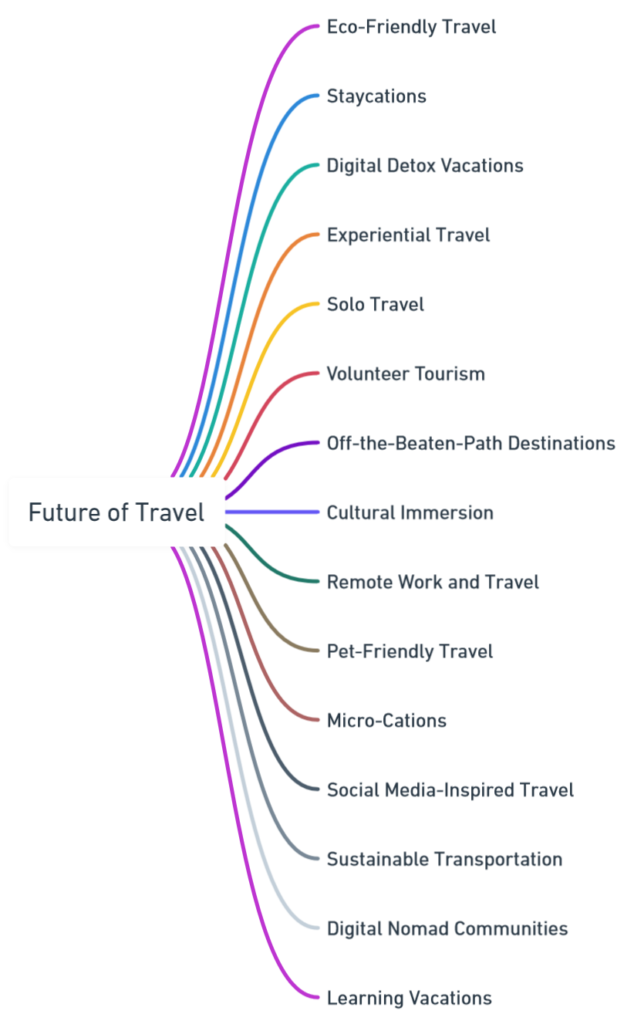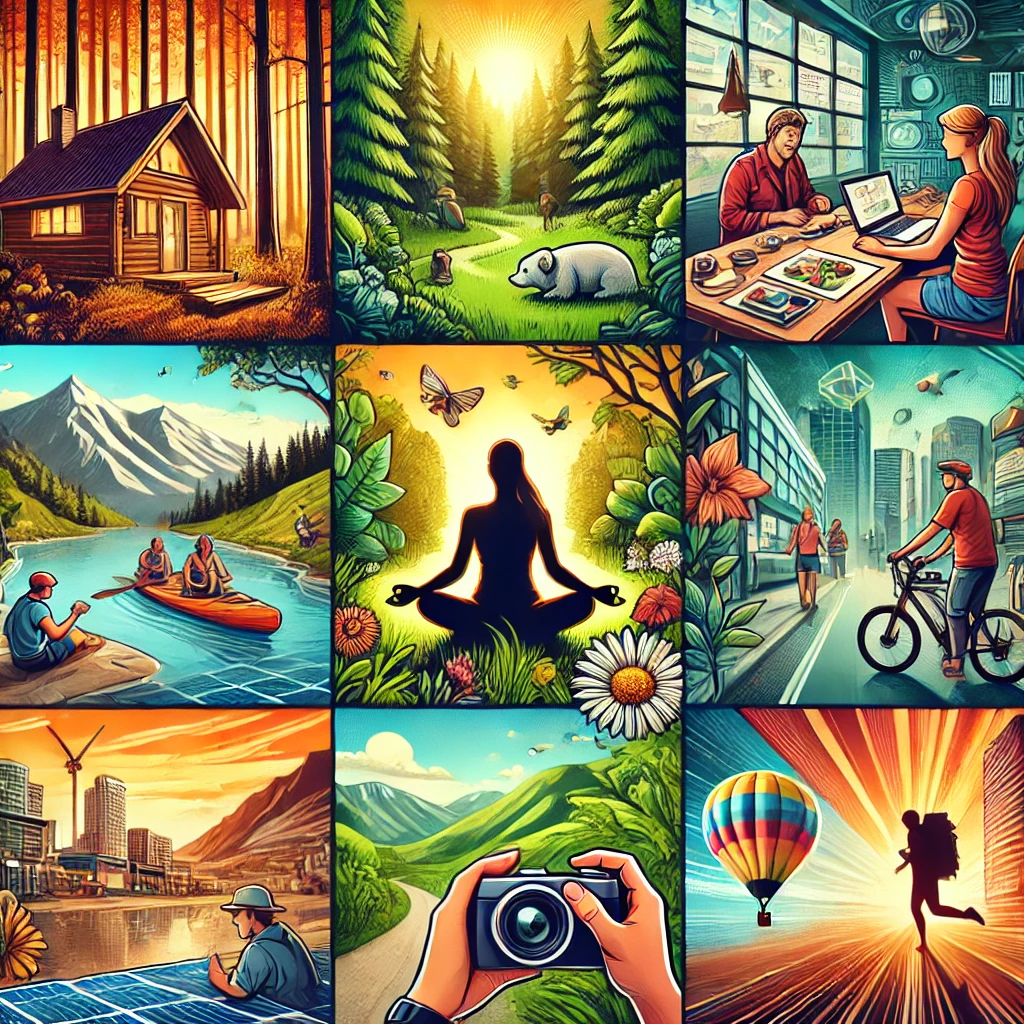Which Travel Trends Will Transform the Tourism Industry?
Travel evolves rapidly as we adapt to new global challenges and seek unique, meaningful experiences. Generation Z is leading the way. The future of travel will be more sustainable, immersive, and tech-savvy.
Knowing these tourism trends is important for travelers seeking better experiences and for businesses wanting to stay competitive. In this article, we’ll explore 15 key travel trends shaping the future of tourism. Tour providers can learn to create unforgettable travel experiences. They can also stay relevant in a changing industry.

1. Eco-Friendly Travel
Eco-friendly travel is now mainstream, with travelers actively seeking sustainable choices in accommodations and tours. This trend involves staying in green-certified hotels, minimizing plastic use, and supporting local conservation. A desire to reduce our environmental impact and preserve destinations for future generations drives eco-friendly tourism.
According to Booking.com’s Sustainable Travel Report, 83% of global travelers desire to travel sustainably. This growing interest reflects a shift toward eco-conscious tourism.

2. Staycations: Local Getaways Redefined
Staycations have become increasingly popular as travelers discover hidden gems in their local areas, reducing both travel costs and environmental impact. Whether it’s a weekend retreat or a day trip to a nearby attraction, staycations offer a sustainable and convenient way to explore while supporting local economies. The flexibility of staycations makes them appealing, especially for busy individuals.
Case Study: California’s “Calling All Californians” campaign, launched by Visit California, encourages residents to explore their own state. In that way they are supporting local tourism and reducing the carbon footprint associated with international travel. This effort showcases California’s wide-ranging attractions and encourages people to choose staycations over distant travels. It offers a more eco-friendly and fulfilling experience.
3. Digital Detox Vacations
As technology becomes more embedded in daily life, digital detox vacations are emerging as a remedy. These vacations offer travelers the chance to escape screens and immerse in nature, promoting mental well-being and relaxation. Remote locations like secluded cabins and off-the-grid retreats are ideal for these escapes. They allow travelers to unwind without the distractions of the online world.
A study by GlobalWebIndex found that 70% of consumers have tried to moderate their digital consumption in some way. This reflects a significant interest in digital detoxing. Many travelers believe reducing device usage can enhance their travel experiences.
4. Experiential Travel: Beyond Sightseeing
Experiential travel focuses on immersive experiences that allow travelers to deeply connect with the local culture, rather than simply sightseeing. This trend emphasizes activities like cooking classes, craft sessions, and historical workshops, which foster cultural immersion and meaningful interactions. Experiential travel encourages learning and participation, giving travelers a more profound and lasting appreciation of the destination.
5. Solo Travel
Solo travel continues to rise, especially among Generation Z, who value self-discovery and independence. Solo travelers enjoy the freedom to create their schedules, meet new people, and explore at their own pace. Solo travel offers a unique opportunity for personal growth. Allowing travelers to step out of their comfort zones and gain confidence.
Brooke Saward, the creator of World of Wanderlust, is a well-known solo traveler and influencer who inspires others with her travel tips and experiences. Through her blog, she shares destination guides, solo travel advice, and beautiful photography, encouraging readers to explore the world independently.
6. Volunteer Tourism: Travel with a Purpose
Combining travel with volunteering is a fulfilling way to make a difference while exploring new places. Volunteer tourism includes activities such as teaching, wildlife conservation, and community projects, allowing travelers to impact the destinations they visit positively. This trend creates memorable experiences by giving travelers a sense of purpose.
7. Off-the-Beaten-Path Travel Destinations
Many travelers are choosing off-the-beaten-path travel destinations to avoid crowded tourist spots and discover hidden gems. These destinations provide a sense of adventure and authenticity, allowing travelers to experience less commercialized aspects of a region’s culture and landscape.
8. Cultural Immersion: Connecting with Local Traditions
Engaging deeply with local culture is a priority for many travelers, leading to the rise of cultural immersion experiences. Activities like homestays, traditional cooking classes, and craft workshops offer insights into daily life and customs, fostering respect and global awareness.
Airbnb’s Experiences program offers locally-led activities worldwide, helping travelers immerse themselves in local cultures through cooking classes, dance lessons, and craft workshops.
9. Remote Work Travel: Work from Anywhere
The shift to remote work has given rise to remote work travel, allowing professionals to work while traveling. This trend has sparked the growth of digital nomad communities that provide flexible co-living and co-working spaces. Digital nomadism offers a balanced lifestyle for those looking to explore the world without sacrificing work.
According to a 2020 report by Upwork, it was projected that by 2025, 22% of the American workforce would be working remotely. This trend has accelerated significantly, especially following the COVID-19 pandemic.
10. Pet-Friendly Travel
More travelers are bringing pets along on their journeys, prompting the growth of pet-friendly travel options. This trend has encouraged hotels, restaurants, and attractions to cater to pet owners, making it easier to include furry companions in travel plans.
Example of Pet-Friendly Destinations:
- Asheville, North Carolina: Known for pet-welcoming breweries and hiking trails.
- Amsterdam, Netherlands: Pet-friendly parks, cafes, and boat rides.
- Tokyo, Japan: Pet cafes and accessible pet-friendly parks.
Example of Pet-Friendly Accommodations:
- Kimpton Hotels (U.S.): Known for being pet-friendly with no additional fees.
- The Milestone Hotel (London): Luxurious pet amenities and nearby parks.
- Petbnb (Various Locations): A pet-focused rental option similar to Airbnb.
Pet-Friendly Activities
- Outdoor Adventures: Hiking trails, beaches, and parks that welcome pets.
- City Tours: Pet-friendly walking or open-air bus tours.
- Pet Events: Festivals, pet parades, or meet-ups in the destination.
11. Micro-Cations: Short and Frequent Getaways
Micro-cations, or short trips, are gaining popularity as people opt for multiple brief getaways rather than long vacations. These quick escapes allow travelers to recharge without extended time off, making it ideal for busy professionals.
12. Social Media Travel Trends
Social media has greatly influenced travel, with many travelers choosing destinations based on Instagrammable locations. Social media travel trends drive travelers to visit unique spots and participate in popular activities to share memorable content online.
13. Sustainable Transportation
Sustainable transportation is a priority for eco-conscious travelers who seek to reduce their carbon footprints. Electric vehicles, bicycles, and public transportation options are increasingly popular in tourism, reflecting a global shift toward environmentally friendly travel.
Consumers know that sustainable tourism comes at a price, and they’re willing to pay for it. A report by Skift notes that 68% of travelers are now more likely to choose eco-friendly transportation.
14. Digital Nomad Communities
Digital nomad communities give remote workers the perfect mix of work and social life. They set up shared living and working spaces where people can really get things done while also making new friends. These places come with perks like super-fast internet that keeps you connected without a hitch.
Shared work areas let you focus and get creative, while also offering a chance to network with like-minded people. You’ll meet others living the same lifestyle, which can lead to meaningful collaborations and friendships.
While some might worry about the costs or the transient nature of these communities, the benefits like enhanced productivity and the chance to build a solid support network often outweigh those concerns.
15. Learning Vacations: Travel with Purpose
Learning vacations combine travel with skill-building, allowing travelers to gain new abilities, such as photography, cooking, or language learning. This type of travel is both enjoyable and enriching, offering meaningful experiences beyond traditional sightseeing.
How Idemoly Can Support These Travel Trends
At Idemoly, we believe memorable travel experiences come from authentic connections and immersion in local cultures. Our travel services help you explore the heart and soul of each destination through the eyes of locals. Idemoly empowers you to become a tourpreneur, guiding you on how to create unique, impactful travel experiences.
Visit our How It Works page to learn more about how Idemoly can turn your travel dreams into reality and make you a leader in the tourism industry.
Contact us today and let’s create a world where every traveler feels like a local, and every local has the opportunity to share their story.
FAQ Section
What are the main travel trends in 2024?
A: Major trends include eco-friendly travel, digital detox vacations, staycations, solo travel, and experiential travel, among others.
How is eco-friendly travel impacting tourism?
A: Eco-friendly travel encourages sustainable practices, reducing environmental impact and preserving destinations, with 83% of travelers expressing interest in sustainability.
What is a digital detox vacation?
A: A digital detox vacation involves disconnecting from technology to focus on mental well-being. Travelers often choose remote locations for these tech-free getaways.
How can businesses support sustainable transportation?
A: Tourism businesses can promote eco-friendly options like public transit, electric vehicle rentals, and biking routes to encourage sustainable travel.
What is a tourpreneur?
A: A tourpreneur is a professional who creates unique travel experiences, often focusing on immersive, authentic connections with destinations.


